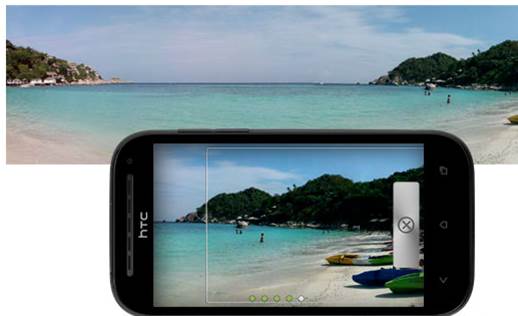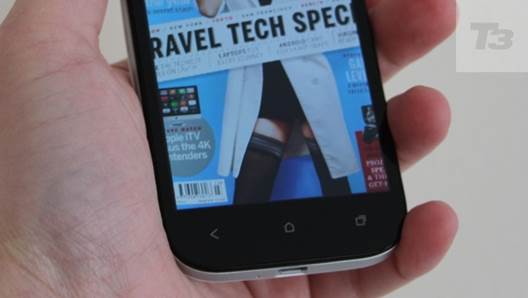A modest 5MP camera can adorn the back of
the One SV, but HTC has not skimped on “trivial decorations”: autofocus,
backside illumination sensor, f/2.0 lens, ImageCHIP, HDR, burst shooting,
recording videos and taking photos at the same time, slow motion video
recording and so on. We had laid high hopes on the slogans attached to the
camera, and to some extent it has done a good job. You can take a number of beautiful
photographs, including macro photos, with the best results happening in natural
light. Color and exposure is very commendable, especially when using the HDR
setting. However, indoor performance is slightly bad. “Playing” with white
balance settings proved useless in all scenarios, even outdoors. In automatic
mode, it is quite accurate, but you might also apply filters to the viewfinder
with all other options. Low light performance is acceptable, as long as you
have firm hands.

Lots
of camera features but low resolution
One thing we had a problem with was the
"smart flash" feature, which adjusts the intensity of the light
depending on the distance to the object. It is erratic and during the test, we weren’t
able to tame it. We mainly jumped into deeper settings, but ISO, exposure,
contrast, saturation and sharpness adjustments are all available for users to
change. We changed the sharpness a bit: it seemed to be slightly too high by
default. Panorama mode is quite challenging. We never succeeded in capturing a
series of five images, so we imagined that only a robotic arm can keep the
accuracy of panning the camera that it requires. Oh, and a note about digital
zoom for you: do not use it.
The camera application is fast to open, and
the shutter speed is ultra-fast, as proved by the burst-capture feature.
Recording video is a slightly different story. The 1-second boot time feels
like forever compared to speed of shooting photos. Fairly accurate brightness
levels and slow motion mode that allow recording videos with high fps speed in
return require a sacrifice of quality – an interesting feature to play with.
One problem you may have noticed in the sample clips below is that the
autofocus lagged quite often. This happened while recording videos and taking
each frame. Overall, the 5MP photos and videos are possible to be used – it’s
only that they cannot be compared with those of the One S or X. Those who like
self-portrait and video calling may have worse results with the 1.6MP front
camera.
Performance and battery life
What stays below to keep everything moving
is a dual-core 1.2GHz Snapdragon S4 Plus processor with Adreno 305 GPU
(MSM8930) and 1GB RAM. Do not worry about the little storage of 8GB, as the
microSD slot with 32GB memory card support can be found under the back lid on
the removable battery, beside the micro-SIM hole. In terms of connectivity, it
has LTE, 802.11a/b/g/n – both 2.4GHz and 5GHz - Bluetooth 4.0 and NFC.

Inside
HTC One SV
If the One SV is a piece of broken biscuit,
then the overall performance will be its bar of chocolate. We've said this
before – scrolling through menus is very quick. It did not cycle through the
screen as fast as the One X does, but it did not crash or skip a screen while
we were swiping with an erratic speed. Waking the device from complete sleep
mode takes about 7 seconds (with 7 or 8 seconds more for everything else to
wake, too) and the time for loading applications is also very fast, with one
second for most applications to be ready to use. The browser is very
interesting, and basically, the websites appearing in the browser are available
as fast as how your connection allows it to be (Chrome is slightly slower, but
not much).
GTA III is the game that requires our selected
resource, and the initial launch time reflected higher demand. It took up to 5
seconds to start the game, which often made us quit the game due to lack of
patience. It is fully playable on the graphics settings from low to moderate;
if higher, the One SV begins to struggle, but it still continues to run at a
lower frame rate. Riptide GP, a spectacular racing game that was released one
year earlier than GTA III, ran smoothly with maximum images. To summarize, we
were surprised how fast the device proved to be depended on the components
inside – the WVGA screen must parcially be held responsible for this,
certainly.

The
HTC One SV is a mid-range Android smartphone - with the added bonus of 4G.
We would like to talk briefly about the
sound. Of course, the Beats brand will not leave the One SV, and the sound
reinforcement in the music player is available, as well as in third-party
applications such as YouTube. However, it does not work with external speakers,
which produces average loudness and quality. Nonetheless, it is still
sufficiently loud to annoy other people on public transportations if it is in
your pocket. The call quality was clear (remember, it’s not HD), though we
could not point out the role of any noise reduction. The Wi-Fi and mobile connections
had no problem, and the device has LTE. EE’s 4G network has not been much
developed, and in the South of London where the author of this article stayed,
the high-speed data collection was not homogeneous. However, when we had the
opportunity to perform speed tesst, the speed ranges were from 25Mbps/download
and 10Mbps/upload to 40Mbps/download and 15Mbps/upload.
It's time to take a deep look at the
statistics! Just like human beings, no device looks exactly like one another,
but there are not many differences between the One SV and One VX that has
recently been reviewed. The similar S4 processor can be found on the two
devices, and many other specifications are also shared by them, although the
One VX has a large 4.5-inch screen of 960x540 pixels. Test scores showed very
similar performance between the two, and the AnTuTuscores made them nearly a
match with the powerful X-One. Comparing the One S with the SV, we saw that
both deserve to show off depending on the method that you're viewing. The interesting
thing we found when running SunSider was the statistics above were shown on the
available browser, whereas in Chrome the scores were a lot worse.
We performed a battery test on the One SV’s
1800mAh battey as we often do: repeating 1 video, brightness at 50%, GPS and
Wi-Fi on but only LTE connected, 1 push email account and a couple of social
networks regularly updated. The phone ran out of power after nearly eight hours
of running. While it did not beat the period of more than 10 hours that some
devices can achieve, it survived one hour and a half longer than the VX, over
60 minutes longer than the V, S or X. These tests were very useful, but how
does it run in daily use? Acceptable, but not outstanding. It can handle
several tasks, from moderate to frequent ones, for the whole day, including the
browser, taking photos, updating status, and playing normal games, but not much
more. The One SV cannot escape from the nightly charging ritual that we are all
familiar with. You will not be disappointed with its battery life, but do not
expect it to last more than one day if you use your thumb regularly.
|
One SV
§ Quandrant
v2: 4,718
§ Vellamo
2.0: 1,491
§ GLBenchmark
2.5 Egypt 1080p Offscreen (fps): 12
§ CF-Bench:
7,518
§ SunSpider
0.9.1 (ms): 1,418
§ AnTuTu
3.1.1: 10,871
One VX
§ Quandrant
v2: 5,242
§ Vellamo
2.0: 1,268
§ GLBenchmark
2.5 Egypt 1080p Offscreen (fps): 12
§ CF-Bench:
7,423
§ SunSpider
0.9.1 (ms): 1,504
§ AnTuTu
3.1.1: 10,552
One V
§ Quandrant
v2: 1,636
§ Vellamo
2.0: 1,155
§ GLBenchmark
2.5 Egypt 1080p Offscreen (fps): N/A
§ CF-Bench:
N/A
§ SunSpider
0.9.1 (ms): 3,215
§ AnTuTu
3.1.1: N/A
One S
§ Quandrant
v2: 5,053
§ Vellamo
2.0: 2,452
§ GLBenchmark
2.5 Egypt 1080p Offscreen (fps): N/A
§ CF-Bench:
9,457
§ SunSpider
0.9.1 (ms): 1,743
§ AnTuTu
3.1.1: 7,067
One X
§ Quandrant
v2: 6,369
§ Vellamo
2.0: 1,638
§ GLBenchmark
2.5 Egypt 1080p Offscreen (fps): 9.7
§ CF-Bench:
13,750
§ SunSpider
0.9.1 (ms): 1,274
§ AnTuTu
3.1.1: 11,030
|